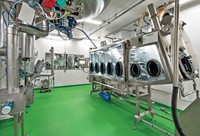Advertisement
Grab your lab coat. Let's get started
Welcome!
Welcome!
Create an account below to get 6 C&EN articles per month, receive newsletters and more - all free.
It seems this is your first time logging in online. Please enter the following information to continue.
As an ACS member you automatically get access to this site. All we need is few more details to create your reading experience.
Not you? Sign in with a different account.
Not you? Sign in with a different account.
ERROR 1
ERROR 1
ERROR 2
ERROR 2
ERROR 2
ERROR 2
ERROR 2
Password and Confirm password must match.
If you have an ACS member number, please enter it here so we can link this account to your membership. (optional)
ERROR 2
ACS values your privacy. By submitting your information, you are gaining access to C&EN and subscribing to our weekly newsletter. We use the information you provide to make your reading experience better, and we will never sell your data to third party members.
Business
Editorial: Crystal balling the drug services sector
by Michael McCoy
January 19, 2024
| A version of this story appeared in
Volume 102, Issue 2
Since this year’s World Chemical Outlook (see page 24) doesn’t include a prediction about the pharmaceutical outsourcing industry, I’m using this space to provide one of my own. But first, a little history.
In the late 1990s, the drug outsourcing business was all the rage. Big chemical companies like Dow, Eastman, and the former Monsanto chemical business Solutia clamored to become contract development and manufacturing organizations (CDMOs), which supply drug companies with the intermediates and active pharmaceutical ingredients (APIs) they need to make finished drugs.
The moment of peak frothiness was probably the year 2000, when Clariant acquired the British firm British Tar Products for about $1.8 billion.
In the years that followed, the big companies sobered up and gradually made their exits, choosing to focus on their core businesses, basic and specialty chemicals. Eastman, one of the most eager US players, wound down its efforts. Solutia sold two European companies it had acquired and was itself later acquired by Eastman. Rhodia and Clariant sold their CDMO businesses for pennies on the dollar.
What these chemical companies learned is that making drug intermediates and APIs is an unnervingly choppy business. Sales rise and fall as pharmaceutical clinical trials succeed or fail and as venture capitalists embrace or reject investment in the biotech industry.
The 2010s and the early part of this decade were rising years for the outsourcing industry—the lab-supply firm Thermo Fisher Scientific entered the API business in 2017 with a $7.2 billion acquisition—but several signs point to difficult days ahead.
In September, the CEO of Lonza, by most measures the world’s largest CDMO, abruptly left. The company was vague about the reasons, but Chairman Albert M. Baehny said in a press release that “recent months have undoubtedly been challenging.” The following month, EuroAPI, another large player, said its CEO would step down. Again, little explanation was offered.
Catalent, a US-based CDMO focused on biologic drugs, also shows signs of struggle. In November, it announced that sales had fallen 4% in its most recent quarter and spoke of working to get its performance back to prepandemic levels.
More recently, the debt-rating firm Moody’s Investors Service downgraded its view of the French CDMO Seqens. Moody’s cited several events, including the closure of a plant in Massachusetts after a fatal accident; a dispute with Mithra Pharmaceuticals over a contract to make the molecule estetrol, used in a birth control drug; and disruptions at a Seqens facility in Israel after the outbreak of the war between Israel and Hamas.
Seqens seems to have its own special problems. I suspect the other firms are essentially sound but suffering from a resetting of investor expectations as the outsourcing boom brought on by the COVID-19 pandemic wanes.
Lonza, for example, had a big contract to supply ingredients and other services to Moderna for its COVID-19 vaccine, but at an October investor event, Lonza executives disclosed that Moderna was ending the deal. Lonza’s stock price took a hit that day and is now down more than 60% from its June 2023 peak. Similarly, Catalent had a hand in making three COVID-19 vaccines. Its stock price hit highs last March and is now down almost 50%.
The rise and fall of the COVID-19 vaccine business is an example of the choppiness that CDMOs face. The last 2 years have been tough for the biotech sector, after what one analyst recently called “the free-money party we saw in 2020 and 2021.” And as money for biotech firms dries up, the CDMOs that serve them suffer.
I hope there’s not another global pandemic. Thus, I predict a sober year for CDMOs, one that will include a lot of belt tightening and maybe more CEO departures.
Views expressed on this page are those of the author and not necessarily those of ACS.






Join the conversation
Contact the reporter
Submit a Letter to the Editor for publication
Engage with us on Twitter